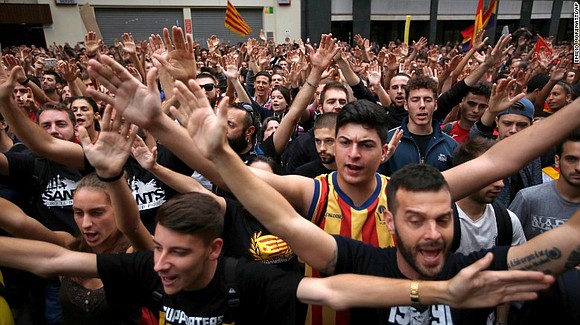Huge Protests in Barcelona After Catalan Referendum Crackdown
CNN/Stylemagazine.com Newswire | 10/3/2017, 6:20 a.m.
By Hilary Clarke, Claudia Rebaza and Isa Soares, CNN
(CNN) -- The center of Barcelona was brought to a halt Tuesday as Catalans vented their anger at the violent crackdown by Spanish security forces of Sunday's disputed independence referendum.
Large crowds of people gathered in the city center, angered by the harsh treatment meted out by Spanish national police who tried to prevent the banned vote from taking place.
Shops were closed, universities halted classes and transport companies ran reduced services as supporters of Catalonia's bid for independence from Spain attempted to maintain the momentum from Sunday's vote.
Facing Spain's biggest political crisis in decades, the Spanish Prime Minister held talks with opposition parties in Madrid. The European Parliament was due to hold a debate on the crisis later on Tuesday.
The main trade unions, the CCOO and UGT stopped short of declaring a general strike, describing the action instead as a "work stoppage" to skirt labor laws that forbid strikes for political reasons.
'The streets will always be ours'
The Catalan President Carles Puigdemont said he expected strong support for the day of action. On Monday he called for international mediation to resolve the crisis.
Protesters gathering in Barcelona said they were motivated by fury at the violent crackdown. "This is a protest against police violence and maintaining momentum after Sunday," said Victor Noguer, 27, a fire fighter.
"The streets will always be ours," protesters chanted.
Officers from the Guardia Civil and the Catalan police force stood guard outside the local headquarters of the Spanish government in Barcelona, where hundreds of firefighters gathered. Other groups of protesters gathered outside the headquarters of the Guardia Civil.
The presence of the Spanish national police and the civil guard police in Catalonia is a source of increasing tension in the city following Sunday's violence.
According to AFP, one hotel in a nearby coastal town told 200 officers who were staying there to leave because of protests outside. Spanish newspaper La Vanguardia reported that two large cruise ships that have also been housing police officers drafted to Catalonia are to remain in the port of Barcelona until October 11.
Spain's Interior Minister, Juan Ignacio Zoido, said Madrid would "take all necessary measures" to stop the "intolerable harassment" of national security forces.
The Catalan government says it earned the right to split from Spain, claiming 90% of those who voted in Sunday's poll were in favour of independence. But the result was not decisive: turnout was low, at around 42%.
The Catalan health ministry said 893 people were injured in the clashes Sunday as riot police raided polling stations, dragged away voters and fired rubber bullets.
Catalan authorities blamed the crackdown for the low turnout, but it remains clear that public opinion in Catalonia is deeply split on independence.
Catalan President Carles Puigdemont stopped short of declaring independence for Catalonia Monday. According to the referendum law passed by the Catalan Parliament -- and declared illegal by Spain's top court -- authorities have 48 hours after the result to declare a split. Catalan authorities have not yet presented a final result to the Parliament in Barcelona.
Spanish PM unrepentant
On Monday, an unrepentant Spanish Prime Minister Mariano Rajoy met Spanish opposition leaders to discuss the government's next moves.
A statement released Monday night by the Spanish government described Sunday's events as a "serious situation of institutional disobedience in this community."
It said that during his meetings the Prime Minister "has strongly defended the actions of the security forces during yesterday's events and has reiterated that more than 400 officers needed (medical) attention and 40 needed emergency attention because of their injuries."
Rajoy's office said Tuesday that he was considering calling a special session of Spain's Congress of Deputies to discuss the crisis.
So far, European Union leaders and the European Commission have backed the Spanish government's opinion that the referendum was illegal. The UN Commissioner for Human Rights however has asked to be allowed to send in experts to examine if citizens rights have been violated.




